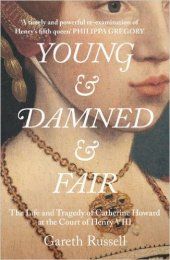Young and Damned and Fair: The Life and Tragedy of Catherine Howard at the Court of Henry VIII

Young and Damned and Fair: The Life and Tragedy of Catherine Howard at the Court of Henry VIII - Gareth Russell
Non-Fiction
Pages: 512
In the soap-opera saga that is the history of Henry VIII's reign, Catherine Howard often gets short shrift. In the best case she's dismissed as a flighty, sex-crazed adulteress; in the worst she's lumped with Anne Boleyn in the 'beheaded' category, with no identity beyond one of six, without even a name. Gareth Russell seeks to bring Catherine out from the shadows in this new biography, and in many respects he does an admirable job. He explores Catherine's childhood and upbringing in great depth, shedding new light on the lives of those who grew up away from the Tudor court. He has a fine turn of phrase, and a real knack of personalising and enlivening his narrative - this is lively history, not a dry dusty recitation of facts.
In only one area do I feel I can fault this biography, and this is in his failure to even explore, let alone explain, Catherine's motivations. Her actions before marriage may be one thing, but why would she have been so careless, so reckless, as to pursue love affairs under the very nose of her husband? And a husband who was the king and had already executed one wife already? It makes no sense that she would court her own destruction as she did, knowing full well the potential consequences and the likelihood of exposure, given that she was the Queen and privacy a very scarce resource indeed. But Russell never once stops to wonder why.
The answer to Catherine's behaviour surely lies in her upbringing - a young beautiful girl growing up cossetted and pampered in a lax moral environment, with almost no discipline, oversight or role models, exposed to men who preyed on and exploited her, manipulated her to their own ends. Russell seems to take Catherine's behaviour as a teenager almost for granted, sees her as a fully willing participant in all her relations with men - but even in the Tudor world young aristocratic women did not habitually embark on multiple sexual affairs with men. And whilst many young women were married at an age we would consider abhorrent now, for a young Tudor girl to willingly lose her virginity at 13 suggests something deeply wrong, and a reprehensible lack of care and dereliction of duty in those responsible for her. There is surely some deeper psychological impetus at play with Catherine - some linking of sexual desire and masculine approval, a desire to please. One must remember too how young she was - scarcely 21 when she was executed.
But Russell touches on none of these issues. Whilst he never judges or dismisses her as flighty or promiscuous, the very lack of any notion that Catherine's behaviour may have been downright unusual and worth exploring in more detail is telling. Catherine's sexual behaviour marks her out as highly unusual amongst her peers, and that may well be a clue to explaining the tragedy of her life. What Catherine did that led to her tragic execution is one thing; but exploring why is, to me at least, a far more intriguing bit of research. But perhaps it takes a woman to see...